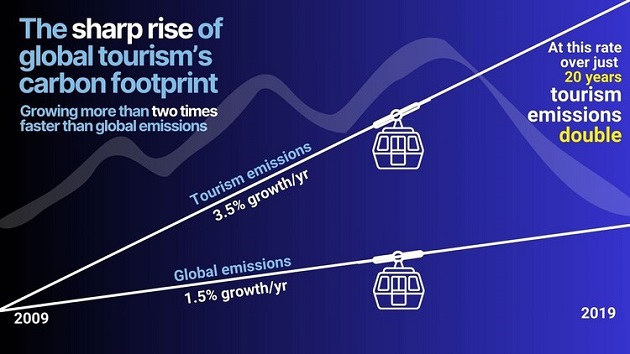How global tourism is negatively impacting climate change
Written by ABC Audio ALL RIGHTS RESERVED on December 11, 2024

(NEW YORK) — The carbon footprint from the travel industry is growing at rates never seen before, according to new research.
An increasing demand for international travel over the past decade has led to higher rates of carbon dioxide emissions every year, according to a paper published in Nature Communications on Tuesday.
Greenhouse gas emissions from international tourism are growing at a rate of 3.5% every year — about twice as fast as the overall economy, Ya-Yen Sun, an associate professor at The University of Queensland in Australia and an author of the study, told ABC News.
In the top 20 countries associated with the highest tourism emissions, tourism may be growing “too fast” — up to 5% every year — which is causing those regions to expend more energy to provide services to more visitors, Sun said.
There are also disparities in per-capita tourism emissions, with the 20 highest-emitting countries — including the United States, China and India — contributing three-quarters of the total carbon footprint, the paper found.
Modes of transportation, including air and ground travel, are particular contributors to emissions given their carbon-intensive nature, according to the paper. Slow gains in the efficiency of technology have also contributed to the rise in emission rates from global tourism, the researchers said.
While travel halted in 2020 due to the COVID-19 pandemic, tourism came roaring back with a vengeance once the global health threat subsided, which has flooded the travel sector with even more rapid growth, Sun said.
Travel dropped by 60% during the pandemic, but tourism is expected to have fully recovered by the end of 2024, she added.
“We found this is something [that really needs] a lot of attention, because people just enjoy travel,” Sun said.
Carbon dioxide emissions from private planes have increased significantly in recent years, a separate paper published last month in the journal Communications Earth & Environment found.
Annual CO2 emissions from private aviation increased by 46% between 2019 and 2023, according to an analysis of flight tracker data from 18,655,789 private flights flown by 25,993 registered business jet-type private aircraft. Some individuals who regularly use private aviation may produce almost 500 times more CO2 in a year than the average individual, the paper found.
There were significant emissions peaks around certain international events, the study found. COP28 — the 2023 United Nations Climate Change Conference held in Dubai — was associated with 644 private flights, which produced 4,800 metric tons of carbon dioxide, and the 2022 FIFA World Cup, also hosted in the United Arab Emirates, was associated with 1,846 private flights, producing an estimated 14,700 metric tons of CO2, the study found.
However, private aviation only accounts for about 7.9% of total aviation emissions, the paper found.
A previous study that Sun conducted in 2018 found that tourism contributes to about 8% of global greenhouse gas emissions. That number is likely much higher today, Sun said.
“The sector has not made much progress in terms of decarbonizing itself,” she said.
Sun described the findings of the new paper out Tuesday as “quite problematic” because it showcases that emissions from tourism are growing every year,
The paper highlighted the urgent need for effective policy measures to align the tourism sector with global climate goals, the researchers said.
In order to do this, countries will need to begin to monitor tourism emissions at the national level, something that only New Zealand and Denmark are currently doing, Sun said.
It is especially important considering tourism is one of the biggest economic sectors in the world, as people require transportation, food, accommodation and shopping when they travel, Sun said. The global tourism industry was worth an estimated $10 trillion in 2023, according to the World Travel & Tourism Council.
“We found this is something really in need of a lot of attention, because people just enjoy travel,” Sun said.
Copyright © 2024, ABC Audio. All rights reserved.
 KVSP
KVSP 




